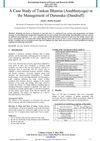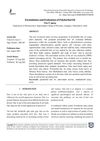 8 citations,
October 2018 in “Journal of Investigative Dermatology”
8 citations,
October 2018 in “Journal of Investigative Dermatology” Many patients with Alopecia Areata in Korea experience anxiety, depression, and reduced quality of life, which are often unrelated to the severity of hair loss.
 19 citations,
August 2010 in “Journal der Deutschen Dermatologischen Gesellschaft”
19 citations,
August 2010 in “Journal der Deutschen Dermatologischen Gesellschaft” Certain plant extracts can effectively treat skin conditions like athlete's foot, chronic vein problems, sun damage, skin growths, vitiligo, and hair loss, and may also improve skin appearance.
1 citations,
May 2021 in “Research journal of topical and cosmetic sciences” Muttaijow ComplexTM improved skin, hair, and nail health in middle-aged adults.
 44 citations,
July 2011 in “Dermatologic Therapy”
44 citations,
July 2011 in “Dermatologic Therapy” Finasteride effectively increases hair growth in men with AGA, works better for those over 30, and may cause some side effects.
2 citations,
June 2020 in “Journal of Investigative Dermatology” 3D imaging of skin biopsies offers better accuracy but is time-consuming and can't clear melanin.
 January 2019 in “Srpski Arhiv Za Celokupno Lekarstvo”
January 2019 in “Srpski Arhiv Za Celokupno Lekarstvo” The technique improved hair transplant success and patient satisfaction by matching hair growth direction.
 October 2015 in “Elsevier eBooks”
October 2015 in “Elsevier eBooks” Finasteride helps hair growth and prostate issues but may cause sexual side effects and increase tumor risk.
 June 2001 in “International Journal of Cosmetic Surgery and Aesthetic Dermatology”
June 2001 in “International Journal of Cosmetic Surgery and Aesthetic Dermatology” Finasteride improves hair growth in men with androgenetic alopecia.
 104 citations,
October 1999 in “The Journal of Urology”
104 citations,
October 1999 in “The Journal of Urology” Finasteride doesn't harm male fertility or sperm quality, but may slightly reduce ejaculate volume.
 7 citations,
March 2014 in “ISRN Biomaterials”
7 citations,
March 2014 in “ISRN Biomaterials” Keratin hydrogel from human hair helps rats recover better from spinal cord injuries.
 May 2024 in “International Journal of Science and Research (IJSR)”
May 2024 in “International Journal of Science and Research (IJSR)” Tankan Bhasma mixed with coconut oil effectively reduced dandruff and improved scalp health.
 August 2015 in “Dermatologica Sinica”
August 2015 in “Dermatologica Sinica” Men with severe hair loss may have poorer sperm quality.

Finasteride is a safe and effective long-term treatment for male hair loss, especially when started early.
 38 citations,
May 2006 in “Archives of Gynecology and Obstetrics”
38 citations,
May 2006 in “Archives of Gynecology and Obstetrics” Women with only irregular periods or excess hair have a better hormone profile than those with full PCOS, but both groups are similar, indicating a need for better PCOS diagnosis methods.
 31 citations,
January 2014 in “Journal of endocrinological investigation”
31 citations,
January 2014 in “Journal of endocrinological investigation” Woodhouse-Sakati syndrome often causes sexual development issues, hair loss, learning disabilities, deafness, muscle contractions, limb pain, and diabetes.
 16 citations,
January 2020 in “Diabetes”
16 citations,
January 2020 in “Diabetes” A new therapy sped up wound healing and reduced scarring in diabetic rats.
 1 citations,
August 2021 in “International journal of scientific research in science and technology”
1 citations,
August 2021 in “International journal of scientific research in science and technology” The polyherbal hair oil promotes hair growth, reduces hair loss, and is safe to use.
 1 citations,
January 2014 in “Hair transplant forum international”
1 citations,
January 2014 in “Hair transplant forum international” Heavy smoking and other factors may lead to reduced blood flow and tissue death after hair transplant surgery.
1 citations,
March 2010 in “International Journal of Cosmetic Science” The Aqualon SLT device measures hair stiffness and slipperiness to evaluate hair treatments.
 August 2024 in “Quality in Sport”
August 2024 in “Quality in Sport” PRP helps with skin, hair, and wound treatments but needs more research for standard use.
45 citations,
July 2006 in “Journal of Investigative Dermatology” Chemotherapy affects blood vessels in hair follicles, not stem cells, allowing hair regrowth.
2 citations,
May 2022 in “Stem cell research & therapy” Disrupted stem cell signals in hairpoor mice cause hair loss.
 April 2024 in “Applied biological chemistry”
April 2024 in “Applied biological chemistry” Piperine from black pepper can make hair less oily by blocking fat cell development in hair roots.
January 2016 in “Dermatology Online Journal” Hormonal therapy changes skin and hair in transgender patients, who need better researched dermatologic care.
75 citations,
September 2015 in “Acta biomaterialia” Alkylation of human hair keratin allows for adjustable drug release rates in hydrogels for medical use.
 42 citations,
February 1985 in “Journal of the American Academy of Dermatology”
42 citations,
February 1985 in “Journal of the American Academy of Dermatology” Excessive hair growth can be assessed by history, exam, and blood tests, and treated with medication like dexamethasone, birth control pills, and spironolactone.
 40 citations,
January 1996 in “Journal of Dermatological Treatment”
40 citations,
January 1996 in “Journal of Dermatological Treatment” Antimicrobial lotion reduces inflammation and increases hair density in hair loss patients.
 28 citations,
May 1986 in “Clinics in endocrinology and metabolism”
28 citations,
May 1986 in “Clinics in endocrinology and metabolism” New compounds may soon be tested to treat excessive hair growth in women.
 12 citations,
January 2018 in “Biomaterials Science”
12 citations,
January 2018 in “Biomaterials Science” Softer hydrogel surfaces help maintain hair growth-related functions in skin cells.
 11 citations,
August 2004 in “Facial Plastic Surgery”
11 citations,
August 2004 in “Facial Plastic Surgery” The endobrow-midface lift is a safe and effective way to rejuvenate the upper face with minimal complications and rare temporary hair loss.






















